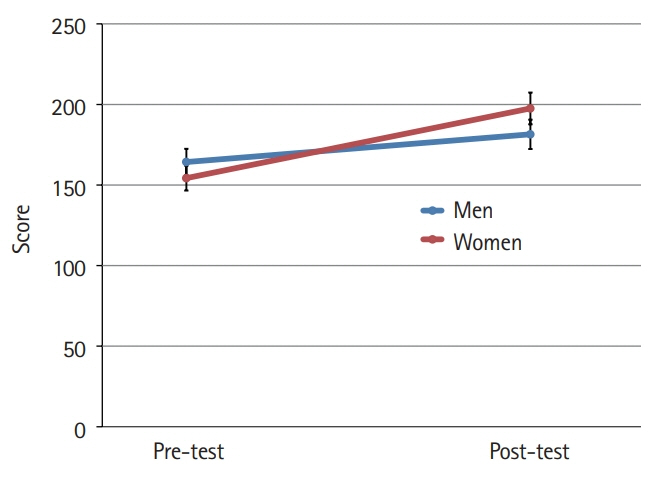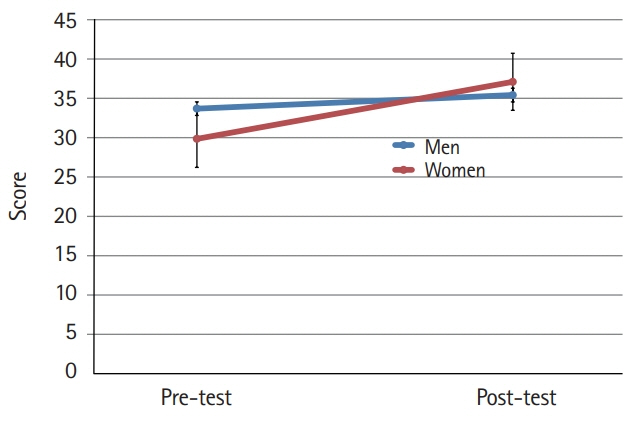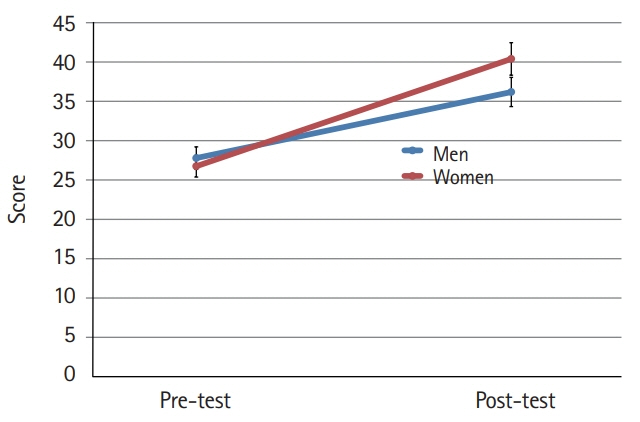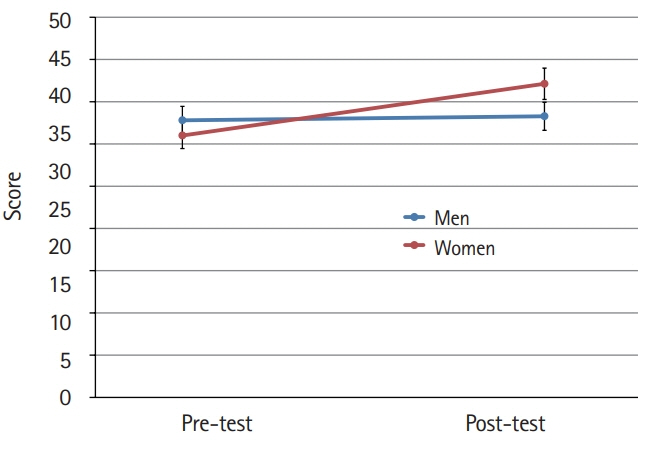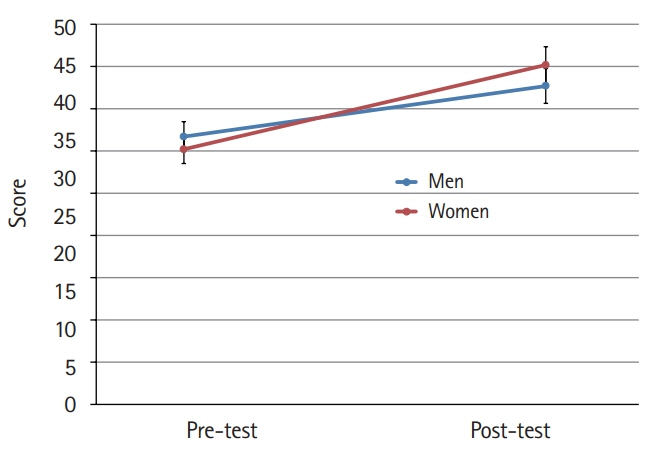J Educ Eval Health Prof.
2019;16:39. 10.3352/jeehp.2019.16.39.
Effects of a cultural nursing course to enhance the cultural competence of nursing students in Korea
- Affiliations
-
- 1Department of Nursing, Dongyang University, Yeongju, Korea
- 2School of Nursing and Research Institute in Nursing Science, Hallym University, Chuncheon, Korea
- KMID: 2502160
- DOI: http://doi.org/10.3352/jeehp.2019.16.39
Abstract
- Purpose
With Korea’s recent rapid change into a multicultural society, cultural competence is being emphasized as a core nursing competency. This study investigated the effects of a cultural nursing course that aimed to enhance the cultural competence of nursing students in Korea.
Methods
This was a single-group pre- and post-comparison study. The subjects were 69 nursing students at Dongyang University who attended a cultural nursing course in 2015, of whom 62 students responded to the survey. The 13-week cultural nursing course was held for 2 hours a week. The methods of the course included small group activities, discussions and presentations, experiential learning, reflective activities, and lectures. Nursing students’ cultural competence was measured pre- and post-course with the Cultural Competence Scale for Korean Nurses, which contains 33 items scored on a 7-point Likert scale.
Results
After completing the cultural nursing course, students’ total cultural competence scores increased, as did their scores in each category (cultural awareness, cultural knowledge, cultural sensitivity, and cultural skills) (P<0.001). There was no significant difference in cultural competence by gender (P<0.001).
Conclusion
This cultural nursing course was found to be effective in enhancing the cultural competence of nursing students. Therefore, the educational program developed in this study can be extended to other university-level nursing programs in Korea.
Figure
Reference
-
References
1. Korean Statistical Information Service. Statistics of immigrants and foreigners [Internet]. Daejeon: Statistics Korea;2017. [cited 2019 Dec 22]. Available from: http://kosis.kr/statisticsList/statisticsListIndex.do?menuId=M_01_01&vwcd=MT_ZTITLE&parmTabId=M_01_01&statId=1976077&themaId=A#SelectStatsBoxDiv.2. Ministry of Health and Welfare. Press releases 38 foreign patients in 2018, cumulative 22.6 million people in 10 years [Internet]. Sejong: Ministry of Health and Welfare;2018. [cited 2019 Dec 22]. Available from: http://www.mohw.go.kr/react/al/sal0301vw.jsp?PAR_MENU_ID=04&MENU_ID=0403&CONT_SEQ=349095.3. Park HS, Ha SJ, Park JH, Yu JH, Lee SH. Employment experiences of nurses caring for foreign patients. J Korean Acad Nurs Adm. 2014; 20:281–291. https:/doi.org/10.11111/jkana.2014.20.3.281.
Article4. Jeong GH, Park HS, Kim KW, Kim YH, Lee SH, Kim HK. A concept analysis of cultural nursing competence. Korean J Women Health Nurs. 2016; 22:86–95. https://doi.org/10.4069/kjwhn.2016.22.2.86.
Article5. Giger JN, Davidhizar RE. Transcultural nursing: assessment and intervention. 5th ed. St. Louis (MO): Mosby Elsevier;2008.6. Lee NY, Eo YS, Lee JW. Level of cultural competence (CC) and educational needs for cultural competence in nursing (CCN) in undergraduate nursing students. J Korean Acad Soc Nurs Educ. 2015; 21:16–27. https://doi.org/10.5977/jkasne.2015.21.1.16.
Article7. Kim SH. Transcultural self-efficacy and educational needs for cultural competence in nursing of Korean nurses. J Korean Acad Nurs. 2013; 43:102–113. https://doi.org/10.4040/jkan.2013.43.1.102.
Article8. Lin CJ, Chang PR, Wang LH, Huang MC. Cultural competence course for nursing students in Taiwan: a longitudinal study. Nurse Educ Today. 2015; 35:1268–1274. https://doi.org/10.1016/j.nedt.2015.05.023.
Article9. Faul F, Erdfelder E, Buchner A, Lang AG. Statistical power analyses using G*Power 3.1: tests for correlation and regression analyses. Behav Res Methods. 2019; 41:1149–1160. https://doi.org/10.3758/BRM.41.4.1149.
Article10. Chae DH. Development of a cultural competence scale for Korean nurses [dissertation]. Seoul: Yonsei University;2013.11. Campinha-Bacote J. A model and instrument for addressing cultural competence in health care. J Nurs Educ. 1999; 38:203–207. https://doi.org/10.3928/0148-4834-19990501-06.
Article12. Papadopoulos I, Tilki M, Taylor G. Transcultural care: a guide for health care professionals. Dinton: Quay Books;1998.13. Long TB. Overview of teaching strategies for cultural competence in nursing students. J Cult Divers. 2012; 19:102–108.14. Gallagher RW, Polanin JR. A meta-analysis of educational interventions designed to enhance cultural competence in professional nurses and nursing students. Nurse Educ Today. 2015; 35:333–340. https://doi.org/10.1016/j.nedt.2014.10.021.
Article15. Choi JS, Kim JS. Effects of cultural education and cultural experiences on the cultural competence among undergraduate nursing students. Nurse Educ Pract. 2018; 29:159–162. https://doi.org/10.1016/j.nepr.2018.01.007.
Article16. Lee GC, Park YS, Lee HK, Lee KJ. The effect of a convergence multi-cultural nursing education program on cultural competence and empathy for nursing students. J Digit Converg. 2015; 13:337–346. https://doi.org/10.14400/jdc.2015.13.12.337.
Article
- Full Text Links
- Actions
-
Cited
- CITED
-
- Close
- Share
- Similar articles
-
- Mediating Effect of Cultural Competence between Cultural Empathy and Nursing Professionalism in Nursing Students
- Effects of Emotional Intelligence, Multicultural Perception on Cultural Competence in Nursing Students
- Cultural Competence and Factors Influencing Cultural Competence in Nursing Students
- Effects of the Experiences of Multicultural Education and Multicultural Contact on Cultural Competence among Korean Nursing Students
- Effects of a Cultural Competence Educational Program for Nursing Students

